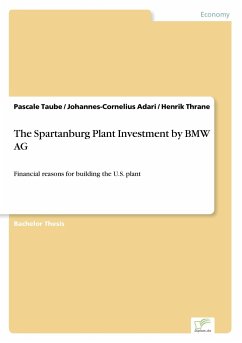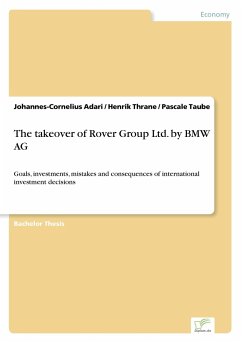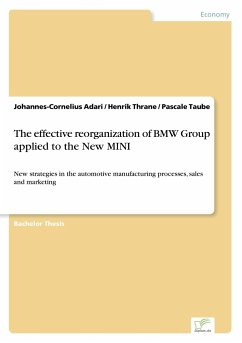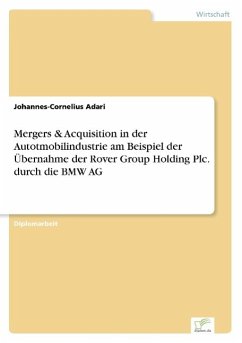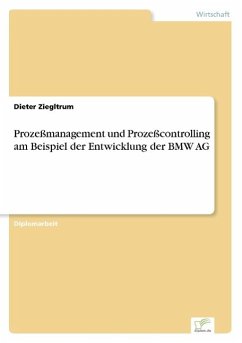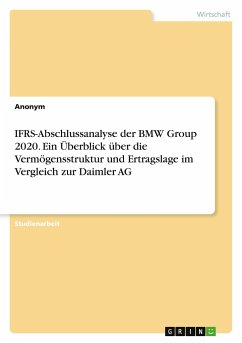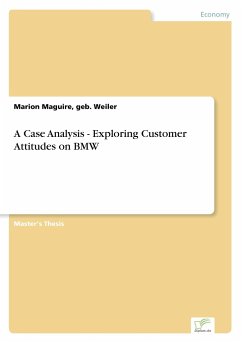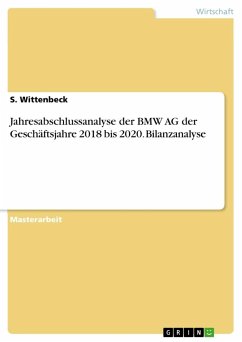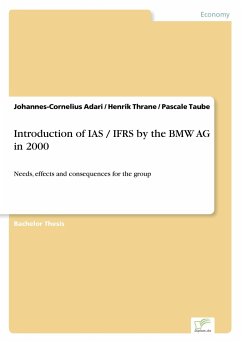
Introduction of IAS / IFRS by the BMW AG in 2000
Needs, effects and consequences for the group
Versandkostenfrei!
Versandfertig in 1-2 Wochen
74,00 €
inkl. MwSt.

PAYBACK Punkte
0 °P sammeln!
Bachelor Thesis from the year 2004 in the subject Business economics - Supply, Production, Logistics, grade: 1,6, Hogeschool Zeeland (Economics), language: English, abstract: Inhaltsangabe:Abstract:This case study deals with an important financial aspect of multinational companies, i.e. their obligation of accounting. Until the year 2000, BMW used to prepare its annual external audits under German Commercial Code Standards (HGB). This tradition ended in 2000, when BMW accounted under International Accounting Standards (IAS) for the first time.7 years before, Mercedes-Benz was the first German ...
Bachelor Thesis from the year 2004 in the subject Business economics - Supply, Production, Logistics, grade: 1,6, Hogeschool Zeeland (Economics), language: English, abstract: Inhaltsangabe:Abstract:
This case study deals with an important financial aspect of multinational companies, i.e. their obligation of accounting. Until the year 2000, BMW used to prepare its annual external audits under German Commercial Code Standards (HGB). This tradition ended in 2000, when BMW accounted under International Accounting Standards (IAS) for the first time.
7 years before, Mercedes-Benz was the first German automotive manufacturer adopting international Standards in 1993. But in Mercedes case US-Generally Accepted Accounting Principles (US-GAAP) were chosen, because the objective was to become listed at the New York Stock Exchange (NYSE). At this time US-GAAP were not accepted outside the North American Free Trade Association (NAFTA), esp. not by the EU Commission, but the US-Principleswere applied in the largest and most important stock market worldwide. On the other hand, US organizations like the Securities and Exchange Commission (SEC) did not accept any other accounting standards in these days. Accordingly, Mercedes-Benz had to prepare two annual audits: one under US-GAAP and the other under HGB.
This treatment, obviously, was highly inefficient, providing lots of encumbrances to US-capital-seeking European companies: accounting and auditing took too much time, personnel resources and money. Another negative effect was that many US companies hesitated with urgently required investments in Europe. But nevertheless, multinational groups seemed to have several advantages by using international accounting standards, even if they had to prepare more than one audit annually.
Within the 1st part, this case study provides basic information dealing with accounting standards, in particular reasons and objectives, organizational patterns and the process of IASbecoming international accepted by pointing out their most important differences compared to US-GAAP and German HGB Standards.
The 2nd part deals with the reasons of changing BMW s accounting standards by looking at the Group s key markets and the impact of IAS-adoption by examining their figures of non current assets, inventories, other current assets, liabilities & deferred incomes, provisions, equity as well as research & development within a four years comparison.
At last the 3rd part gives an examination and summary of the results of IAS-reception for BMW, the effects on the stock market, changes of rating on the global market and gives hints to future accounting trends in the Automotive sector.
Zusammenfassung:
Die vorliegende englischsprachige Projektarbeit behandelt das Thema internationale Rechnungslegung (international accounting) in der Automobilindustrie am Beispiel der BMW AG, die erstmals im Jahr 2000 die Rechnungslegung nach HGB auf International Accounting Standards (IAS) / International Financial Reporting Standards (IFRS) umstellte.
Ziel der Arbeit ist es, die Gründe, Ziele und die bilanziellen Auswirkungen des Systemwechsels von der nationalen hin zur internationalen Rechnungslegung
am Beispiel von BMW herauszuarbeiten und zu bewerten.
Dazu wurde die Arbeit in 3 Teile untergliedert. Im Vorwort und im 1. Teil werden die allgemeinen Grundlagen der internationalen Rechnungslegung erläutert. Neben der IAS-/ IFRS-Begriffsdefinition, den Zielen und Erwartungen der IAS-/IFRS-Anwender im globalen Wettbewerb wird die Konkurrenz zu den US GAAP-Regeln anhand der historisch bedingten Unterschiede beider Wirtschaftssysteme untersucht, unter besonderer Berücksichtung der Rolle der amerikanischen Börsenaufsicht (US SEC). Dabei wird die Frage der Notwendigkeit eines europäischen Rechnungslegungssystems neben den nationalen Regelwerken beantwortet.
Ansc...
This case study deals with an important financial aspect of multinational companies, i.e. their obligation of accounting. Until the year 2000, BMW used to prepare its annual external audits under German Commercial Code Standards (HGB). This tradition ended in 2000, when BMW accounted under International Accounting Standards (IAS) for the first time.
7 years before, Mercedes-Benz was the first German automotive manufacturer adopting international Standards in 1993. But in Mercedes case US-Generally Accepted Accounting Principles (US-GAAP) were chosen, because the objective was to become listed at the New York Stock Exchange (NYSE). At this time US-GAAP were not accepted outside the North American Free Trade Association (NAFTA), esp. not by the EU Commission, but the US-Principleswere applied in the largest and most important stock market worldwide. On the other hand, US organizations like the Securities and Exchange Commission (SEC) did not accept any other accounting standards in these days. Accordingly, Mercedes-Benz had to prepare two annual audits: one under US-GAAP and the other under HGB.
This treatment, obviously, was highly inefficient, providing lots of encumbrances to US-capital-seeking European companies: accounting and auditing took too much time, personnel resources and money. Another negative effect was that many US companies hesitated with urgently required investments in Europe. But nevertheless, multinational groups seemed to have several advantages by using international accounting standards, even if they had to prepare more than one audit annually.
Within the 1st part, this case study provides basic information dealing with accounting standards, in particular reasons and objectives, organizational patterns and the process of IASbecoming international accepted by pointing out their most important differences compared to US-GAAP and German HGB Standards.
The 2nd part deals with the reasons of changing BMW s accounting standards by looking at the Group s key markets and the impact of IAS-adoption by examining their figures of non current assets, inventories, other current assets, liabilities & deferred incomes, provisions, equity as well as research & development within a four years comparison.
At last the 3rd part gives an examination and summary of the results of IAS-reception for BMW, the effects on the stock market, changes of rating on the global market and gives hints to future accounting trends in the Automotive sector.
Zusammenfassung:
Die vorliegende englischsprachige Projektarbeit behandelt das Thema internationale Rechnungslegung (international accounting) in der Automobilindustrie am Beispiel der BMW AG, die erstmals im Jahr 2000 die Rechnungslegung nach HGB auf International Accounting Standards (IAS) / International Financial Reporting Standards (IFRS) umstellte.
Ziel der Arbeit ist es, die Gründe, Ziele und die bilanziellen Auswirkungen des Systemwechsels von der nationalen hin zur internationalen Rechnungslegung
am Beispiel von BMW herauszuarbeiten und zu bewerten.
Dazu wurde die Arbeit in 3 Teile untergliedert. Im Vorwort und im 1. Teil werden die allgemeinen Grundlagen der internationalen Rechnungslegung erläutert. Neben der IAS-/ IFRS-Begriffsdefinition, den Zielen und Erwartungen der IAS-/IFRS-Anwender im globalen Wettbewerb wird die Konkurrenz zu den US GAAP-Regeln anhand der historisch bedingten Unterschiede beider Wirtschaftssysteme untersucht, unter besonderer Berücksichtung der Rolle der amerikanischen Börsenaufsicht (US SEC). Dabei wird die Frage der Notwendigkeit eines europäischen Rechnungslegungssystems neben den nationalen Regelwerken beantwortet.
Ansc...





